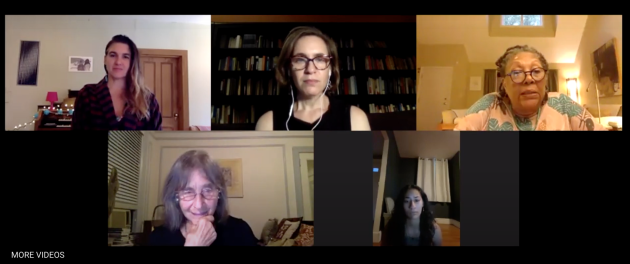
by Elana Rebitzer
Countering Isolation with Poetry
Over the last few months, I have found myself attending fewer and fewer of the Zoom live-streamed events that keep popping up on my Facebook page. What at first seemed like an exciting way to connect to new and old faces in the age of social distancing has started to feel like more of a chore, a less-than-pleasant activity to be avoided whenever possible. Time and time again, I exit these Zoom events feeling even more isolated than before.

“Poetry in Times of Peril,” presented by Hebrew College-Interfaith Youth Core PsalmSeason project, with co-sponsors Jewish Women’s Archive and Lilith magazine, could have added to that feeling of isolation. Instead, it addressed those feelings of isolation head-on, and as a result, actually left me feeling more connected to the rest of the world.
At the event, the poets Alondra Bobadilla, Marilyn Nelson, Alicia Ostriker, and Alicia Jo Rabins each read a poem by another author that has spoken to them recently. They then each shared a poem of their own that touches on some of their recent emotions. The poems varied in style, in length, and theme, but I found myself relating to almost every one of them. Their poems touched on anxiety, fear, isolation, the need for community, ancestry, hope, and so much more.
Hearing those incredibly varied emotions expressed back to back felt like an accurate depiction of the whiplash I find myself feeling on a daily basis. One benefit of watching these events recorded is the ability to pause and rewind whenever a specific line speaks to me, something I could never do at a live poetry reading.
The lines that stood out to me the most are the reminders of the potential for goodness within humanity: “Human horrors are not inevitable. Some people stop themselves before they cross moral divides,” from Nelson’s “Pigeon and Hawk,” and “If community could be evidence to the existence of G-d, would it not be the clearest?”, from Bobadilla’s untitled poem based off of Psalm 133.
Between each poem, and at the end of the readings, the poets spoke to each other about the commonalities they saw in their poems and what they took from each others’ writing. I found the insights they shared moving and inspirational. As Jo Robins put it, many of their poems address the issue of “how to open our hearts to each other.”
Even beyond the insights the poets shared, witnessing this intergenerational exchange itself brought up powerful emotions of community and connection for me. Ostriker mentioned the “sense of sacredness in each human that can be passed along,” a sense that I found so wholly present in each of the poems shared and in the discussions between poets after. When both Ostriker and Nelson shared that they find themselves unable to write poetry, but rather have put their energy into other projects and GOTV efforts, I felt my own creative challenges affirmed.
Most comforting for me was the idea, put forth multiple times through the event, that these times are not, in fact, unprecedented. As the moderator, Dr. Judith Rosenbaum, noted, “We keep talking about unprecedented times, but actually we’re made to cope with this kind of time. We have internal, communal, historical resources, and it is in fact our duty to rise to it.”
The time we find ourselves in is one of literal and emotional isolation, of fear and peril. But through references to community, to ancestry, to a shared sense of hope and possibility in a better future, each of these poets uses language as a means of connection and coping that makes the listener, in turn, feel just a little bit less alone.
***